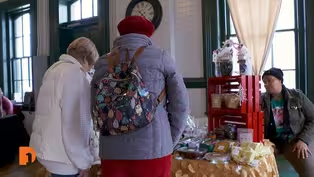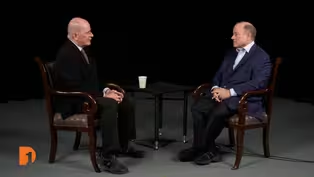
Author David Brooks discusses ‘How to Know a Person’
Clip: Season 9 Episode 24 | 7m 41sVideo has Closed Captions
Best-selling author David Brooks discusses his latest book “How to Know a Person.”
Best-selling author David Brooks has released a new book, “How to Know a Person: The Art of Seeing Others Deeply and Being Deeply Seen.” During a recent visit to Detroit, Brooks sits down with One Detroit contributor Zoe Clark to talk about how to create true human connections to combat isolation, elevate our communities and find a better place than politics to find happiness.
Problems playing video? | Closed Captioning Feedback
Problems playing video? | Closed Captioning Feedback
One Detroit is a local public television program presented by Detroit PBS

Author David Brooks discusses ‘How to Know a Person’
Clip: Season 9 Episode 24 | 7m 41sVideo has Closed Captions
Best-selling author David Brooks has released a new book, “How to Know a Person: The Art of Seeing Others Deeply and Being Deeply Seen.” During a recent visit to Detroit, Brooks sits down with One Detroit contributor Zoe Clark to talk about how to create true human connections to combat isolation, elevate our communities and find a better place than politics to find happiness.
Problems playing video? | Closed Captioning Feedback
How to Watch One Detroit
One Detroit is available to stream on pbs.org and the free PBS App, available on iPhone, Apple TV, Android TV, Android smartphones, Amazon Fire TV, Amazon Fire Tablet, Roku, Samsung Smart TV, and Vizio.
Providing Support for PBS.org
Learn Moreabout PBS online sponsorship(mellow dance music) - David Brooks, welcome.
- Good to be here in Detroit.
- Yeah, it is just a delight to get to sit down to talk with you after reading the book.
- Oh, thank you.
- So as I was reading the book, "How to Know a Person, the Art of Seeing Others Deeply and Being Deeply Seen," I was thinking a lot about who the book was for, right?
Books are for a reader, for an individual, right?
But I was thinking at the same point, this book feels so much more like it's for society, for community right now.
How are you thinking about who this book was written for?
- Yeah, I was sitting on a plane recently and there was a guy next to me and he was reading a book on how to become a writer.
And one of the chapters was, "Pay Close Attention to your Audience."
And I was like, I feel like drawing an X through that.
Like, don't pay attention to that chapter.
So we writers are working out our stuff in public.
And so I'm not naturally good at seeing others.
I'm not the most socially adept human being on the face of the earth.
So I wrote this book to try to get better.
And one of my favorite sayings about writing is from Frederick Buechner, the novelist, "We're beggars who tell other beggars where we found bread."
So if I found something that's useful to make me become more socially adept, more good at seeing people, more good at making them feel understood, then I just take that and I try to pass it along.
And so I wrote it for myself.
But I would say I'm not the only person with this problem.
And so I wrote it in part because we have this loneliness epidemic in society.
We live in a society where 54% of Americans say that nobody knows me well.
Where the number of people who say they have no close personal friends has gone up by fourfold since 2000.
Where 45% of high school students say they're persistently hopeless and despondent.
So we're in the middle of some sort of relational crisis in society.
And to me, one of the reasons for that, not the only one, but the one of them is we just haven't learned how to be considerate toward each other in the concrete circumstances of life.
Like how do you listen well?
How do you become a really good conversationalist?
- So the book begins with the how, right?
Just sort of how to pay attention to a person, how to really engage.
It's really sort of a how to.
All of these really wonderful practical tips.
And then you get to chapter eight, and David Brooks, you just laid out all of these things and then you wrote, I wanna read it for you.
"So far I've been describing a process of getting to know someone as if we live in normal times.
I've been writing this as if we live in a healthy cultural environment in a society in which people are meshed in communities and webs of friendship, trust, and belonging.
We don't live in such a society."
End quote.
It was a gut punch.
- Oh, I'm bringing you down, sorry.
But it sets up what I think is, so the early stuff, like how to be a good listener, the tips for how to be a good conversationalist.
Those are happy tips and easy.
But there are so many times we have painful conversations these days.
And the two main sources of painful conversations, which I try to describe in the book, the first is the political conversation.
And because we just went through an election season, I always do a lot of travel, but I did especially a lot of travel this fall.
- Yeah.
- And I was in blue places, you know, like Boston or Philadelphia, and red places in rural Nebraska, rural Kansas, west Texas, rural Ohio.
And the chasm between the two seems to me just bigger than ever.
And then the conversations across suffering.
- Yeah.
- So sitting with someone who's just lost a child, or in one of my chapters in the book is about how to sit with someone who's depressed.
And so it just seems the graduate level of knowing somebody well is how to know them well in hard circumstances.
Which we're in the middle of an age with a lot of bitterness and polarization and depression and so it's tough seas.
- What are the things in society right now that you see that are helping to bridge?
- Yeah, that's not hard either.
There are so many.
So in 2017, I created something called Weave, the Social Fabric Project.
And it was based on the idea that social trust is really, social distrust is a real problem.
Two generations ago, if you ask people, "Do you trust your neighbors?"
60% said yes.
Now 30% say yes.
And 19% of the millennials.
So we have a lot of distrust in this society.
But there are people in every neighborhood who are building trust at the local level.
- Yeah.
- And so I'm thinking of, there's a guy in in Houston named Pancho Arguelles, and he used to run something called the Living Hope Wheelchair Society.
He would take guys who'd been injured in construction accidents and were paralyzed and he'd give them wheelchairs and diapers and catheters so they could lead dignified lives.
He'd offer them training on how to be social workers.
So you're in Houston and 25 guys in the wheelchairs are wheeling in your neighborhood to help solve your neighborhood's problems.
And the guy who did this, his name is Pancho Arguelles, And he just is spreading trust by being selflessly serving a community.
And I once said to Pancho, you know, "You just radiate holiness."
- And he said, "No, I just reflect holiness."
Which is the right answer.
And so those people are everywhere.
We go into any town in Detroit or McCook, Nebraska or Wilkes, North Carolina, and we just say, "Who's trusted here?"
And people give us names.
And sometimes, like Pancho, they run an organization.
Sometimes they're just neighbors.
- You talk and you've talked in this conversation and in the book a lot about loneliness and sort of the impact that we're seeing in society.
I'm curious about if we, right, the royal we don't choose this path of kindness and caring for each other, what happens?
Like where do we go from here?
I think a lot of folks are wondering in society today.
- Well societies fall apart when distrust is high and people can't work together 'cause they don't trust each other.
- Yeah.
- Societies fall apart when there's no moral order that's cohesive holding them together.
They fall apart when we don't have a common story.
So a diverse, pluralistic society like ours needs to be united by a common story.
We're all moving together towards some end.
But then the very act of being considerate to one another, it sounds like, minute and not that important, but societies break apart when that doesn't happen, because people feel existentially lonely.
'Cause when we are isolated, we not only feel sad, but we feel mean.
Because when you you feel unseen, you feel under threat.
That's how we evolved.
And you feel your dignity is being insulted, which it is.
People are not recognizing me for the human being that I am.
And so you wanna lash out.
And there's a guy named Ryan Streeter at the University of Texas who did a study finding that people who self-identify as lonely are seven times more likely to be active in politics than other people.
So what happens is people go to politics as an attempt to cure their social loneliness, because politics seems to offer belonging.
I'm Team Red or I'm Team Blue.
But it's not belonging like being a part of community.
It's just hating the other people.
And it seems to offer a path of righteousness.
I'm doing something for the country.
But you're not sitting with a widow or serving the poor, you're just hating people on Twitter.
- Well, the book that we've been talking about is "How to Know a Person, the Art of Seeing Others Deeply and Being Deeply Seen."
David Brooks, it's been a pleasure.
- Thank you, it's really been fun.
4th annual Ypsilanti Artisan Market returns to Depot Town
Video has Closed Captions
Clip: S9 Ep24 | 4m 52s | The Ypsilanti Artisan Market returns to support local businesses during the holidays. (4m 52s)
Detroit Mayor Mike Duggan announces his bid for governor
Video has Closed Captions
Clip: S9 Ep24 | 10m 10s | Detroit Mayor Mike Duggan discusses his campaign for governor in a one-on-one interview. (10m 10s)
Providing Support for PBS.org
Learn Moreabout PBS online sponsorship
- News and Public Affairs

Top journalists deliver compelling original analysis of the hour's headlines.

- News and Public Affairs

FRONTLINE is investigative journalism that questions, explains and changes our world.












Support for PBS provided by:
One Detroit is a local public television program presented by Detroit PBS

